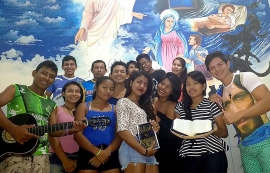By Fr Antonio Ribeiro
Gradually the experience of the oratories was imitated by many priests down the centuries and across Italy, so as to become a pastoral heritage of many dioceses, parishes and religious institutions. Suffice it to recall some recent comments: "two million children and teenagers enrolled, more than 350 thousand volunteers and leaders involved, eight thousand buildings used: these are the statistics for the oratories in Italy for the summer of 2016. (Avvenire, June 15, 2016)
Don Bosco lived in Turin about three centuries after St Philip Neri and popularized the oratory as an educational experience. His deep knowledge of the situation of thousands of poor young people, immigrants, suffering from various addictions, without family, without a religious education, left to themselves, wandering around the streets of Turin, prompted him to start a new kind of Oratory. What he proposed was an experience open to young people of all faiths combined with a variety of educational programmes. At first he offered the young this religious and educational experience on Sundays and public holidays, and later began to offer it every day.
An oratory without God, where there is no mention of Jesus Christ, where the Word of God is not proclaimed, where no one speaks of Our Lady, and where there is no educational environment... is not a Salesian Oratory.
To be faithful to the ideals of Don Bosco the Salesian Oratory must preserve its identity as a socio-educational and evangelising centre, through sport, music, theatre, dance, good friends, groups, prayers and positive messages.
The oratory of the Salesian mission of Santa Isabel of Rio Negro, Amazonas, is a regular part of the afternoons of many young people, who gather there to play, talk, and listen to good music and good messages. At the present time the Salesians and their collaborators are working in particular to prevent addiction, violence and crime in general.


